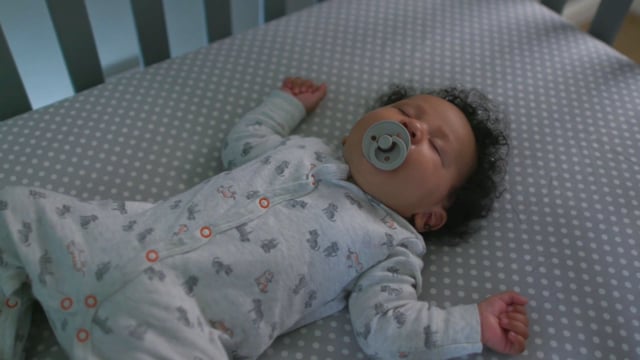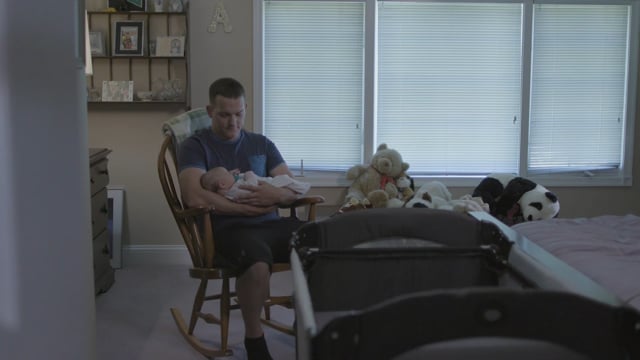Sleep and Your Newborn
Newborns don't yet have a sense of day and night. They sleep around the clock, and because their tiny stomachs don't hold enough breast milk or formula to keep them satisfied for long, they wake often to eat — no matter what time of day or night it is.
How Long Will My Newborn Sleep?
Newborns should get 14–17 hours of sleep over a 24-hour period, says the National Sleep Foundation. Some newborns may sleep up to 18–19 hours a day.
Newborns wake every couple of hours to eat. Breastfed babies feed often, about every 2–3 hours. Bottle-fed babies tend to feed less often, about every 3–4 hours.
Newborns who sleep for longer stretches should be awakened to feed. Wake your baby every 3–4 hours to eat until he or she shows good weight gain, which usually happens within the first couple of weeks. After that, it's OK to let your baby sleep for longer periods of time at night.
The first months of a baby's life can be the hardest for parents, who might get up many times at night to tend to the baby. Each baby has a different sleep pattern. Some start to sleep "through the night" (for 5–6 hours at a time) by 2–3 months of age, but some don't.
-

Safe Sleep for Babies
Keeping your baby safe is your first priority. Learn how to safely put your baby down for a nap, or at bedtime, to help prevent sudden infant death syndrome (SIDS).
-

Helping Your Baby Sleep
Many sleep-deprived parents ask how to get their babies to be better sleepers. Learn what you can do to encourage sleep, what's normal in the first year, and when your little one might sleep through the night.
How Should Babies Sleep?
During the first weeks of a baby's life, some parents choose to room-share. Room-sharing is when you place your baby's crib, portable crib, play yard, or bassinet in your own bedroom instead of in a separate nursery. This keeps baby nearby and helps with feeding, comforting, and monitoring at night. The American Academy of Pediatrics (AAP) recommends room-sharing without bed-sharing.
While room-sharing is safe, putting your infant to sleep in bed with you is not. Bed-sharing increases the risk of SIDS (sudden infant death syndrome) and other sleep-related deaths.
Follow these recommendations for a safe sleep environment for your little one:
- Always place your baby on their back to sleep, not on the stomach or side. The rate of SIDS has gone way down since the AAP began recommending this in 1992.
- Use a firm, flat sleep surface. Cover the mattress with a sheet that fits snugly.
- Do not put anything else in the crib or bassinet. Keep plush toys, pillows, blankets, unfitted sheets, quilts, comforters, sheepskins, and bumper pads out of your baby's sleep area.
- To avoid overheating, dress your baby for the room temperature and don't overbundle. Don't cover your baby's head while they're sleeping. Watch for signs of overheating, such as sweating or feeling hot to the touch.
- Keep your baby away from smokers. Secondhand smoke increases the risk of SIDS.
- Offer a pacifier to your baby at sleep time, but don’t force it. If the pacifier falls out during sleep, you don’t have to replace it. If you're breastfeeding, wait until breastfeeding is firmly established.
- Watch out for other hazards, such as items with cords, ties, or ribbons that can wrap around a baby's neck, and objects with any kind of sharp edge or corner. Look around for things that your baby can touch from a seated or standing position in the crib. Hanging mobiles, wall hangings, pictures, draperies, and window blind cords could be harmful if they are within a baby's reach.
- Don’t let your baby fall asleep on a product that isn’t specifically designed for sleeping babies, such as a sitting device (like a car seat), a feeding pillow (like the Boppy pillow), or an infant lounger (like the Dock-a-Tot, Podster, and Bummzie).
- Don’t use products or devices that claim to lower the risk of SIDS, such as sleep positioners (like wedges or incliners) or monitors that can detect a baby’s heart rate and breathing pattern. No known products can actually do this.
- Don’t use weighted blankets, sleepers, or swaddles on or around your baby.
- Make sure that all sleep surfaces and products you use to help your baby sleep have been approved by the U.S. Consumer Product Safety Commission (CPSC) and meet federal safety standards.
Helping Your Newborn Sleep
Newborns follow their own schedule. Over the next couple of weeks to months, you and your baby will begin to settle into a routine.
It may take a few weeks for your baby's brain to know the difference between night and day. Unfortunately, there are no tricks to speed this up, but it helps to keep things quiet and calm during middle-of-the-night feedings and diaper changes. Try to keep the lights low and resist the urge to play with or talk to your baby. This will send the message that nighttime is for sleeping. If possible, let your baby fall asleep in the crib at night so your little one learns that it's the place for sleep.
Don't try to keep your baby up during the day in the hopes that your little one will sleep better at night. Overly tired infants often have more trouble sleeping at night than those who've had enough sleep during the day.
If your newborn is fussy it's OK to rock, cuddle, and sing as your baby settles down. Swaddling (wrapping the baby in a light blanket) can also help to soothe a crying baby. If you swaddle your baby and they start trying to roll over, that is a sign that you can stop swaddling. For the first months of your baby's life, "spoiling" is definitely not a problem. In fact, newborns who are held or carried during the day tend to have less colic and fussiness.
When Should I Call the Doctor?
While most parents can expect their newborn to sleep or catnap a lot during the day, the range of what is normal is quite wide. If you have questions about your baby's sleep, talk with your doctor.
